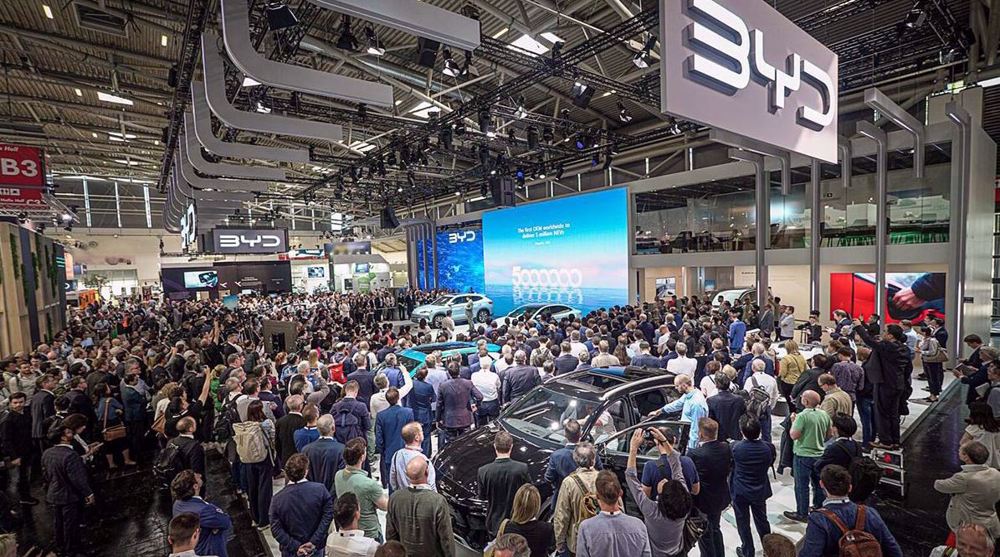US auto workers launch first simultaneous strike at 3 major factories
The United Auto Workers (UAW) union has launched simultaneous strikes at three major car manufacturers in the United States known as the "Detroit Three".
Around 13,000 auto workers stopped working on Friday over a pay dispute with their leaders, picketing at a General Motors assembly plant in Wentzville, Mo., a Ford factory in Wayne, Mich., near Detroit, and a Stellantis Jeep plant in Toledo, Ohio, also known as the "Big Three."
"For the first time in our history we will strike all three of the Big Three," UAW President Shawn Fain said, adding that the workers would continue and expand the strike if the bosses failed to meet their conditions.
The strike is the first of its kind, hitting all three of America’s unionized automakers at the same time.
Picketers were met with cheers from sign-waving union members.
The UAW referred to its targeted strike of three plants as a “Stand Up Strike,” which it called a strategic “new approach” to walking off the job.
“As time goes on, more locals may be called on to ‘Stand Up’ and join the strike,” the union told members. “This gives us maximum leverage and maximum flexibility in our fight to win a fair contract at each of the Big Three automakers.”
The unprecedented strike was launched after weeks of unproductive talks between the union leaders and Detroit Three executives over union demands for a bigger share of profits generated by combustion trucks, and stronger job security as automakers shift to electric vehicles.
The UAW has asked for a 40 percent salary raise. The executives, however, have agreed to a 20 percent rise.
Fain had laid out the plans for the strike less than two hours before the expiration of the workers' annual contracts.
All options are open if the new contracts are not agreed with, Fain warned in his Facebook Live address.
Fain said earlier this week that French-owned Stellantis had proposed to shut down as many as 18 of its US factories.
GM announced that it was disappointed by the strike, and would continue to "bargain in good faith."
Gerald Johnson, GM's top manufacturing executive, claimed in a video that the UAW's wage and benefits proposals would cost the automaker $100 billion, "more than twice the value of all of General Motors and absolutely impossible to absorb."
Fain has rejected the executives' claims, saying the companies have given billions of dollars to share buybacks and executive salaries.
In the meantime, analysts believe the strike is still in its early stages and not considered a serious threat because the automakers still have lots of cars stocked in their depots.
"This is more of a symbolic strike than an actual damaging one," said Sam Fiorani, a production forecaster at Auto Forecast Solutions, who added that he had expected more in the first wave of the strike.
"If the negotiations don't go in a direction that Fain thinks is positive, we can fully expect a larger strike coming in a week or two," he said.
Deutsche Bank estimated that a full strike would hit earnings by about $400 million to $500 million at each affected automaker per week of lost production.
Experts say some of those lost revenues could be recouped by boosting production schedules after a strike, but that possibility fades as a strike extends into weeks and months.
Yemeni armed forces down F-18 fighter jet, repel US-UK attack: Spokesman
Iran warns against US-Israeli plot to weaken Muslims, dominate region
VIDEO | Public uproar in US against Israeli regime
‘Ghost town’: 70% of Jabalia buildings destroyed by Israel
Mother’s Day: Sareh Javanmardi’s inspiring journey as Paralympic champion and mother
Russia downs over 40 Ukrainian drones as Putin vows 'destruction' on Kiev
VIDEO | Yemen: A bone in Israeli neck
D-8’s role in Iran’s economy after Cairo summit











 This makes it easy to access the Press TV website
This makes it easy to access the Press TV website